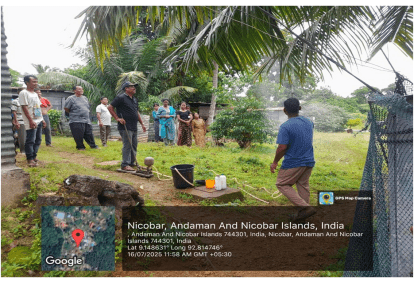A pest infestation involving Mealy Bugs and Rugose Spiralling Whiteflies has triggered a rapid response across the villages of Car Nicobar, where farming communities are grappling with declining plant health in fruits, vegetables, and coconut plantations. Authorities have now launched a coordinated awareness and control campaign to arrest the spread of these destructive pests, focusing on education, cultural management, and biological control.
The outbreak, confirmed through ground-level inspections, has been especially severe in Perka and Malacca villages, where visible symptoms on coconut and vegetable crops have raised concerns among both farmers and officials. Mealy Bugs and Whiteflies are notorious for their rapid reproduction and resistance to conventional chemicals, making early intervention essential to contain crop losses.
In response, a joint task force comprising the District Administration, Tribal Council, Agriculture Department, Central Integrated Pest Management Centre (CIPMC), and the Krishi Vigyan Kendra (KVK) of CIARI has rolled out a structured strategy. The approach includes short-term relief in the form of pest spraying and long-term awareness programs to empower farmers with sustainable pest management techniques.
The team has already begun spraying Neem-based organic pesticides in heavily affected zones. These bio-pesticides serve as a safer alternative to synthetic chemicals, minimizing environmental damage while targeting soft-bodied insects like Mealy Bugs. The adoption of Neem formulations is also in line with the administration’s push for eco-friendly agricultural practices across the Islands.
Beyond direct pest control, farmers are being trained in preventive cultural techniques. These include forced water spraying to dislodge pests, regular pruning to reduce pest habitat, maintaining appropriate plant spacing, and enhancing field sanitation. Farmers are also advised to inspect crops frequently and act at the earliest signs of infestation.
One key aspect of the campaign is the emphasis on community vigilance. Village headmen have been briefed on the situation and instructed to stay alert for signs of pest resurgence. They are also expected to relay reports of any new outbreaks to local agricultural authorities and the KVK for swift action.
Experts warn that if left unchecked, Mealy Bugs and Rugose Spiralling Whiteflies can stunt plant growth, reduce yields, and even kill young plants. The whiteflies, in particular, can also transmit viral plant diseases, compounding the damage. The current campaign seeks to contain the outbreak before it can reach economically devastating proportions.
This intervention follows a broader regional trend of pest resurgence likely driven by climate variability, changes in cropping patterns, and weakened soil health. In island ecosystems like Car Nicobar, such outbreaks can spiral rapidly due to ecological sensitivities and limited options for large-scale chemical control.
The inclusion of KVK-CIARI officials in the ground operations indicates an integrated approach combining traditional agricultural outreach with scientific expertise. Their involvement ensures that farmers receive accurate, research-backed guidance tailored to local conditions.
Officials have also encouraged farmers to adopt pest-resilient cropping cycles and integrate companion planting techniques, which can help repel pests naturally. Going forward, the Agriculture Department plans to monitor the effectiveness of the current control efforts and adapt strategies based on field data and farmer feedback.
While immediate containment measures are underway, the campaign’s long-term success will depend heavily on sustained farmer participation and institutional support. Ensuring that villagers internalize pest management as a continuous practice rather than a one-time response will be key to preventing future outbreaks.
As the farming season progresses, the effectiveness of this multi-agency response will be closely watched, not only for its immediate impact but also for its role in shaping a more resilient and ecologically sound agricultural model for the Nicobar region.





